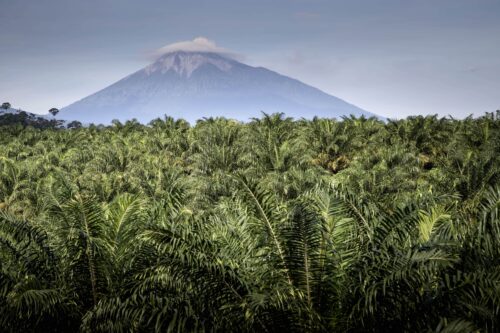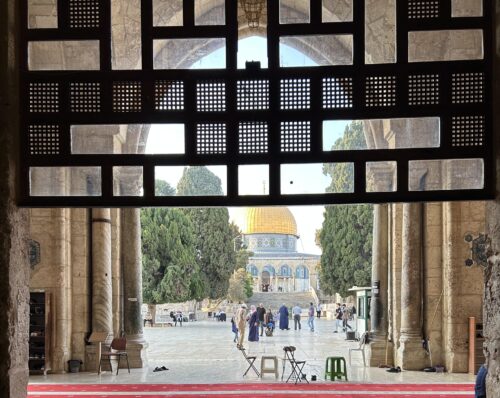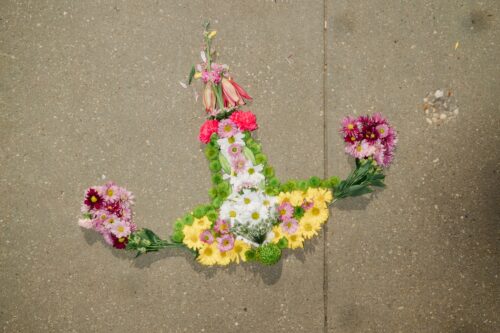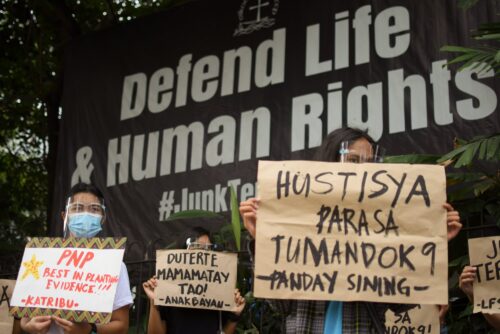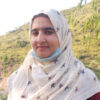This Militarization
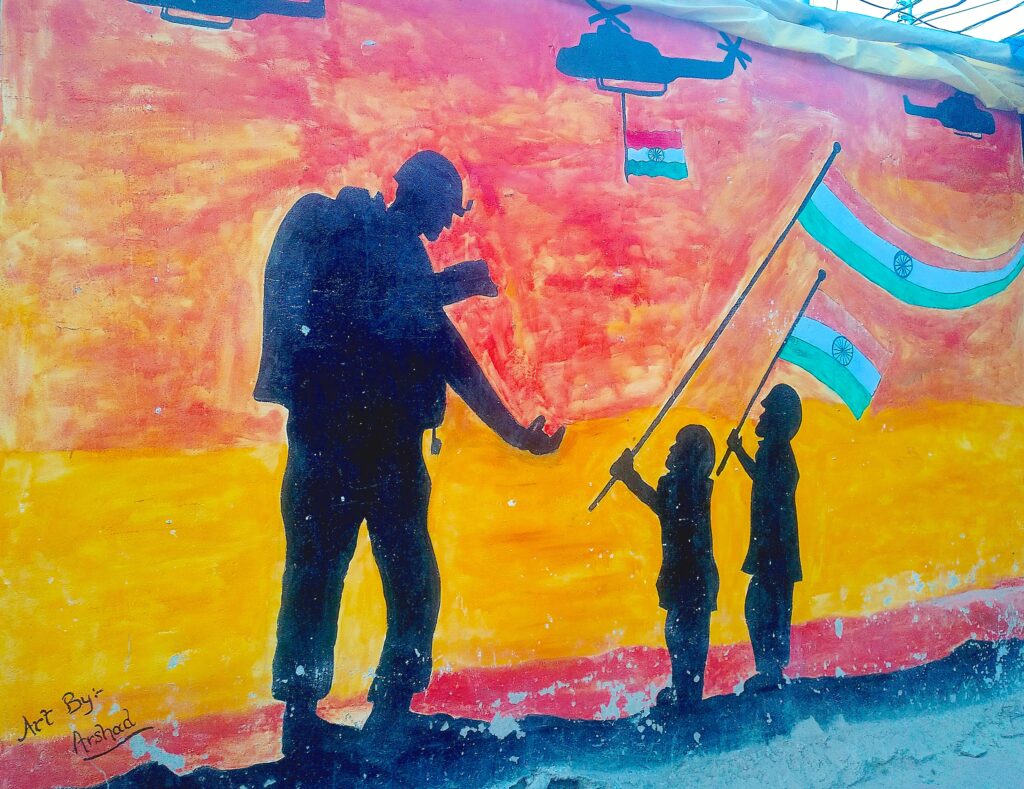
If you missed the introduction to “This Militarization,” you can find it here.
Heavens on Earth are treasures beyond care,
And this is where I was born in the valley of glimpses of Jannat,
[1]
[1]
Jannat is an Urdu word for heaven that is also commonly used in the Kashmiri language.
But that costs you a treasure, too—today, tomorrow, and forever,
Peace on earth never rests forever and overlaps our survival.
This abode of heaven was bound to these times
And finally, they conquered us on October 27, 1947.
[2]
[2]
On this day, the Indian Army landed in Kashmir to evict Pakistani forces and forcefully take control of Jammu and Kashmir. They still have not evacuated the region.
I imagine that day cold and gray,
When the chinar leaves turned crimson red as if they had died,
As if Agha said for them, “I will die, in autumn, in Kashmir.”
[3]
[3]
Agha Shahid Ali was a famous poet who grew up in Kashmir. He later taught creative writing in many U.S. colleges and universities. He was very fond of Kashmir and often wrote his poetic pieces for the love he had for the region. The first section of “The Last Saffron” can be found here. During what was the last stage of his life, he was diagnosed with brain cancer and wished to take his last breath in Kashmir—but he couldn’t do so. He died at age 52.
I became known to this just hours before my birth, when I was still in the womb,
As my Ammi tales it, “You were born on a curfew day.”
[4]
[4]
Ammi is an Arabic word for “mother” that Muslim families often use. Curfew day, frequently imposed in Kashmir, is when common people are supposed to remain in their homes, cited as “home detention.” No vehicular movement is allowed without prior permission of the authorities, or a “curfew pass.” Curfews have been routine in Kashmir and have brought life to a standstill. They are put in place to control any protests of the citizens in order to maintain the law-and-order situation, according to state establishment in Kashmir.
But that was May, when blossoms bloom and chinar leaves turn lush green
Beyond your and my imagination
And as if I say, “I will die, in spring, in Kashmir.”
When that spring will come, I don’t know.
And till then, let me narrate for you the tale of my paradise
Where the day starts with “morning raids,” hurried findings of identity cards.
But they still kill you even if you have an identity card—
Just like they killed Tahir, Danish, and Ather
[5]
[5]
These are the names of young men who were killed by the Indian Army during different time periods from 2013 to 2020. Tahir Sofi, hailing from district Baramulla, was allegedly killed by armed forces of 46 RR (Rashtriya Rifles) on March 5, 2013, while he was returning home from the market. Protests for freedom had broken out against the hanging of Mohammad Afzal Guru, a Kashmiri convicted in a 2001 Indian Parliament attack. Danish Manzoor Lone, an 18-year-old resident of Nadihal Baramulla, was killed by armed forces on August 5, 2016. Protests had erupted against the killing of Hizbul Commander Burhan Wani. Danish was returning home from relatives in Sopore when he was shot by open fire against protestors. I later found out he wrote poetry. Ather Mushtaq Wani, a 16-year-old, was killed in a fake encounter along with his two friends in Srinagar on December 30, 2020. (“Fake encounter” describes extrajudicial killings by security forces.) Ather was quite good-looking. The forces claimed these young men as militants, but they were civilians. Their bodies were not handed over to their families but were buried at a distant place. The poet witnessed these killings as she was growing up. She remembers them because they occurred near her native home, and she regularly comes across the places of these encounters. These sites remind her of the sacrifices of these people and many others.
Some of my age, some a bit older, some a little younger
I remember them terribly as I repeatedly ride through the alleys they were martyred in
They remind me of love for azadi, poetry, and that blond beauty—
[6]
[6]
Azadi is an Urdu word for freedom that Kashmiris use in their common language of resistance and will for freedom.
All of these come from a great sacrifice!
Revolution is a sacrifice, resistance is a sacrifice, azadi is a sacrifice!
Suspension Bridge takes my tales beyond,
[7]
[7]
The Suspension Bridge, also called the Sheikh-ul-Aalam Suspension Bridge, spans the Jhelum River and is located in Dewan Bagh, Baramulla. It offers a splendid perspective of the beauty of the district because of its location, character, and the surrounding river, popular trees, boats, and fishermen. The poet calls this bridge a savior because of the memories of unrest in Kashmir. This bridge was the only medium to cross and reach home or school when curfews were in place or strikes were occurring. Other bridges were closed by armed forces, but this bridge remained at peace, suspended with the memories of resilience the poet carries within herself.
When I turn around while walking on it, the flag of the conqueror waves in the wind,
And when I walk forward, the graffiti of azadi on its pillars takes me to that sacrifice
The sacrifice that we made as school-going children
When our bags were checked by those olive-colored, uniformed hands and beret-capped men,
And when they would demand women to show their faces under a burqa, their tones harsh.
[8]
[8]
Burqa is an Arabic word referring to a garment put on by women that covers their whole body, including their face. Kashmiri women often wear burqas when they step out of their homes as part of their religious and cultural inheritance and obligation.
All aliens to us, as dogs bark when they enter our lanes to signal us, aliens have arrived,
And let me remind you: “Aliens are never accepted, never!”
I knew the names of their battalions since I was a child,
One was to the other side of my maternal home, a CRPF battalion
[9]
[9]
CRPF refers to the Central Reserve Police Force, an internal combat force of the Indian Army working under the Home Ministry. There are many CRPF camps in Kashmir that carry out combat operations ordered by the Indian government.
Whose wicked eyes would pass on to me through their thick window grates.
The other two would fall on my ride to school, 28 RR Army Camp and 46 RR Army Camp—
[10]
[10]
RR (Rashtriya Rifles, or National Rifles) formed in 1990. This counter-insurgency unit carries out operations particularly in Jammu and Kashmir and enjoy special powers under the Armed Forces Special Powers Act. They have mostly been involved in civilian killings, fake encounters, and forced disappearances.
Both would stop civilian vehicles to physically check each person
I would reach school late, again reminding me of an occupied life and its sacrifices.
The elite camp was next to my school, of which we never got a single peep into
The barricade was so tall that only our balls would see their land while we played cricket,
The boys of the school never thought to get those balls back.
The army has a shield at my place—
They barricaded our childhood, fired tear gas and bullets on us, took the men of our homes
Interrogated and killed them in police stations, papa II, cargo
[11]
[11]
Papa II was an infamous interrogation center in Kashmir located at a former colonial residence in Srinagar. It was operated by the Border Security Force and was started during Kashmir insurgency in 1989. It closed in 1996. Many detainees were held and interrogated to an extreme. People often refer to this in common discussions to exercise the level of torture committed by Indian security forces on Kashmiris. Cargo was another open-secret torture house located in Srinagar where young men, journalists, and even older men were interrogated.
In the name of “militants,” “terrorists,” “hybrid militants,” “OGWs,” “informers.”
[12]
[12]
Hybrid militants is a term coined by the Jammu and Kashmir police recently to refer to faceless militants who, according to them, kill civilians and armed forces and then go underground as civilians. This is seen as another tool to tag common civilians as militants. OGWs refers to over-ground workers. According to the Jammu and Kashmir police, it refers to anyone who supports militants. Armed forces label such people as being anti-state and arrest them under the Unlawful Activities Prevention Act and also seize their properties. To the poet, it is another tool of civilian hunting in Kashmir by the Indian establishment.
They occupy our lands and erode its identity, resembling aliens in this heaven;
They make all this their shield.
But heaven is not for aliens, it is meant to be for Kashmiris
Who sacrifice and this sacrifice leads them to azadi
Azadi that is made for heaven only for now and forever.






















